Delaware Personal Data Privacy Act – Easy Compliance Guide
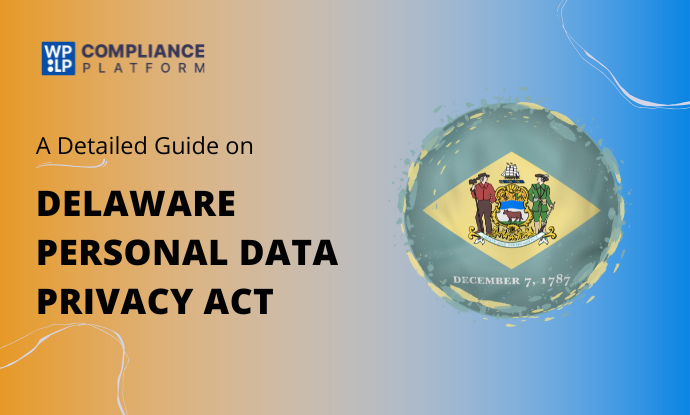
Summary
With strict consumer rights and new transparency requirements, staying ahead of this law is crucial. Please don’t wait until it’s too late! This guide covers everything from what the DPDPA means for your business to easy compliance tips with the WP Legal Pages Compliance Platform.
Are you aware that states’ privacy laws continue to expand with the introduction of the new Delaware Personal Data Privacy Act (DPDPA)?
The DPDPA is considered one of the strictest and strongest data privacy laws in the United States after CCPA. It stands alongside those of Indiana, Iowa, Montana, Oregon, Tennessee, and Texas.
The law outlines how businesses must handle the collection, storage, and usage of consumer data. It also addresses the growing issues of privacy infringement and the misuse of data.
The act also includes essential provisions for consumer rights against businesses while ensuring that robust data security protocols are in place to protect consumer information.
For businesses in Delaware, comprehending DPDPA compliance is a matter of great significance.
This guide will help you determine whether the DPDPA applies to your business and what rights it grants to consumers.
So let’s dive in!
- What is the Delaware Personal Data Privacy Act (ICDPA)
- Who Must Comply With the Delaware Personal Data Privacy Act?
- What are the Consumer Rights Under the Delaware Personal Data Privacy Act
- How Businesses Can Comply With Delaware Act Regulations
- Penalties and Fines for Non-Compliance with the Delaware Privacy Act
- FAQ
- Conclusion
What is the Delaware Personal Data Privacy Act (ICDPA)
The Delaware Personal Data Privacy Act (DPDPA) is a privacy law that grants Delaware consumers rights over their personal data. It also gives organizations direction on how to treat the personal information they process and collect.
On September 11, 2023, Delaware Governor John Carney duly signed House Bill No. 154, the Delaware Personal Data Privacy Act, into law. The law became effective starting January 1, 2025, and grants another year for companies to implement universal opt-outs.
The law protects consumers and applies to businesses in the state that process personal information.
Like most other states’ data privacy laws, the DPDPA uses the term ‘controllers’ to refer to entities that determine the purpose and means of collecting or processing personal data. “Processors” are any entity processing data on behalf of a controller.
Like other state data privacy laws, DPDPA includes provisions from the European Union’s General Data Protection Regulation (GDPR), which outlines the roles and responsibilities of data controllers and processors.
Key Terms and Definitions of DPDPA
The Delaware Personal Data Privacy Act uses some important key terms you need to know in order to meet its various requirements correctly.
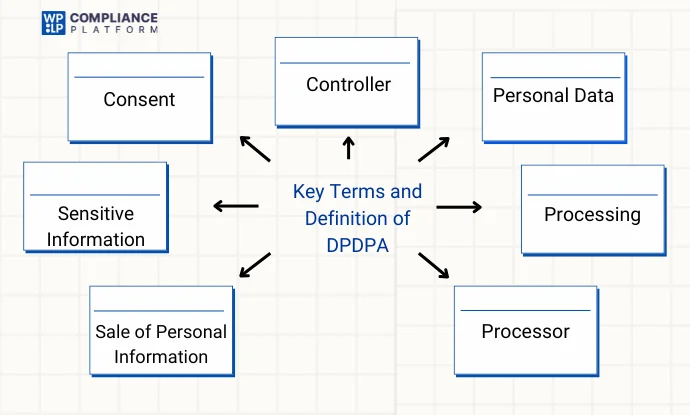
Following is a compiled list of those terms and their definitions exactly as they are written in the DPDPA text:
- Consent: A clear and voluntary action by the consumer that shows they agree to the use of their personal data.
- Controller: An individual, or a combination of individuals, who determines the purpose and means of processing personal data.
- Personal Data: Information that’s connected to an identified or identifiable individual and excludes de-identified information or publicly available information.
- Processing: Any operation performed on personal data. For example, the collection, use, storage, disclosure, analysis, or alteration of personal data.
- Processor: An individual who processes personal data on behalf of a controller.
- Sale of Personal Information: Transfer of personal information for money by the controller to another party.
- Sensitive Information: Personal information containing one or more of the following:
- Information disclosing racial or ethnic origin, religious beliefs, mental or physical health condition or diagnosis (including pregnancy), sex life, sexual orientation, being transgender or nonbinary, being a citizen of a country, or having an immigration status;
- Genetically or biometrically-derived data
- Specific geolocation data.
Who Must Comply With the Delaware Personal Data Privacy Act?
As per Section 12D-103 of the DPDPA, you are required to be in compliance with this legislation.

If you conduct business in the state for Delaware residents, and either meet one of the following during a calendar year:
- Control or process the personal information of at least 35,000 consumers. (not counting personal information processed solely for payment transaction)
- Process or control the personal data of at least 10,000 consumers and receive more than 20% of your gross annual turnover from the sale of personal data
Interestingly, the existing threshold of the DPDPA is quantitatively lower than other U.S. state laws.
What are the Consumer Rights Under the Delaware Personal Data Privacy Act
The following are the consumer rights under the Delaware Personal Data Privacy Act:
Section 12D-104 of the DPDPA specifically gives consumers the right to:
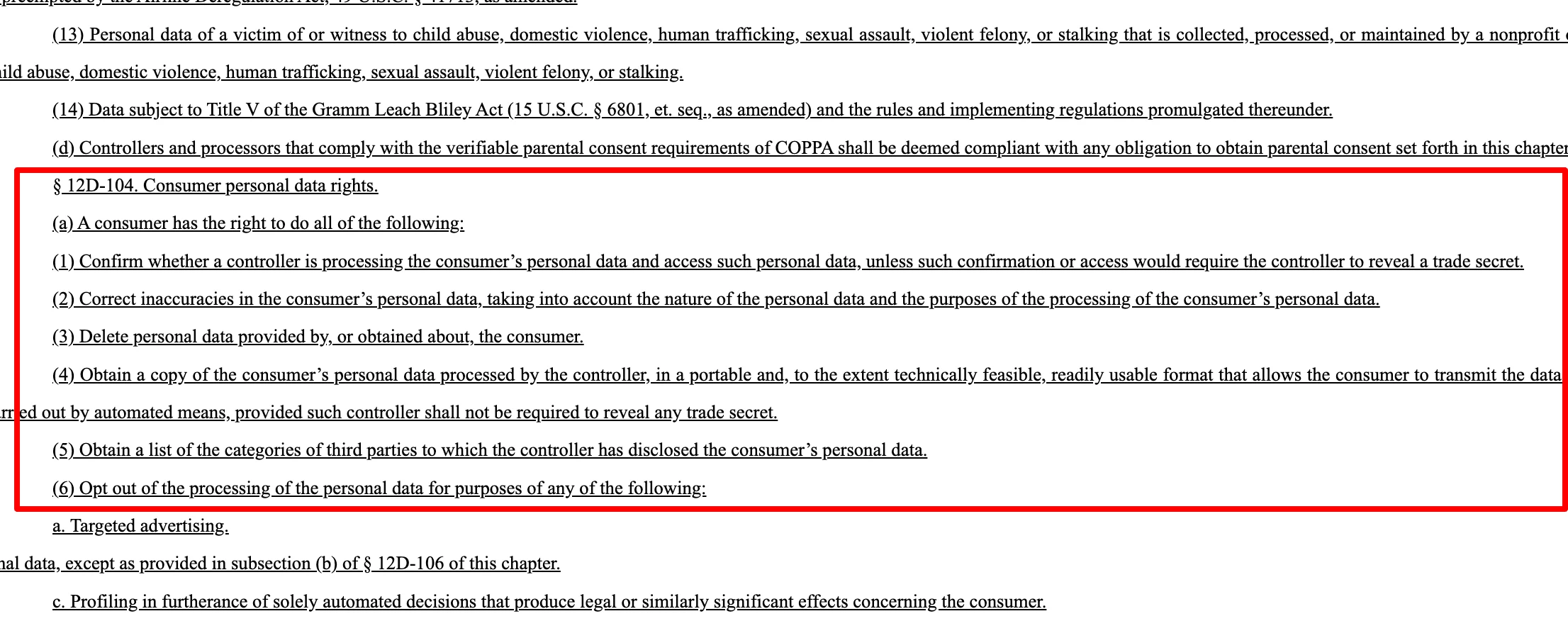
- Right to Know: Consumers have the right to know what information is being gathered about them.
- Right to Access: Consumers can request to access their personal data, which the controller processes
- Right to Correct: The right to have inaccuracies in their personal data corrected.
- Right to Delete or Request: This right allows users to delete their personal data from the organization’s records.
- Right to Portability: The right to receive a copy of their personal data in portable, machine-readable form.
- Right to Receive: The right to get a list of third parties to whom their personal data has been provided.
- Right to Opt-Out: The right to be allowed to opt out of selling their personal data for targeted advertising.
Other privacy regulations, such as the GDPR and the CCPA, also provide similar rights to users.
How Businesses Can Comply With Delaware Act Regulations
Companies can comply with the Delaware Personal Data Privacy Act by revising their privacy policy to comply with the requirements outlined in the DPDPA document.
Covered entities can also make it easy for consumers to assert their data privacy rights in several ways, such as:
- Having a consent banner and,
- Including a data subject access request form on websites.
This law also mandates that covered entities’ websites should comply with Global Privacy Controls.
To comply with Delaware Personal Data Privacy requirements, we recommend that you use a consent management platform (CMP) and privacy policy generator from the WP Legal Pages Compliance Platform.
Here are two ways to comply with the Delaware Personal Data Privacy Act.
Have a Compliant Privacy Policy
The DPDPA mandates that data controllers have a privacy policy on their websites with provisions explaining the categories of personal data they process.
It should also mention how consumers can enforce their rights, and the categories of third parties with whom they disclose personal data, among others.
Let’s consider some of the clauses you need to include to make your privacy policy Delaware compliant.
- The kinds of personal data you process
- Reasons for processing personal data
- How consumers can exercise their rights
- Personal data you disclose to third parties
- Online contact information
- How to opt-out
To create one for your website, we recommend that you use a privacy policy generator like the WP Legal Pages plugin.
WP Legal Pages– Legal Pages Generator

WP Legal Pages plugin provides a simple way of generating legal pages for your WordPress sites. It is possible to generate documents such as Privacy Policy, Disclaimer, Terms and Conditions, and many more in just a few minutes.
WP Legal Pages is a reliable WordPress plugin that ensures your business is able to easily create necessary legal policies quickly. It creates legal policies professionally and in complete compliance with data protection laws.
This policy generator prompts you with easy-to-answer questions about your business’s data processing practices and generates an original policy specific to your answers.
See what it looks like below.
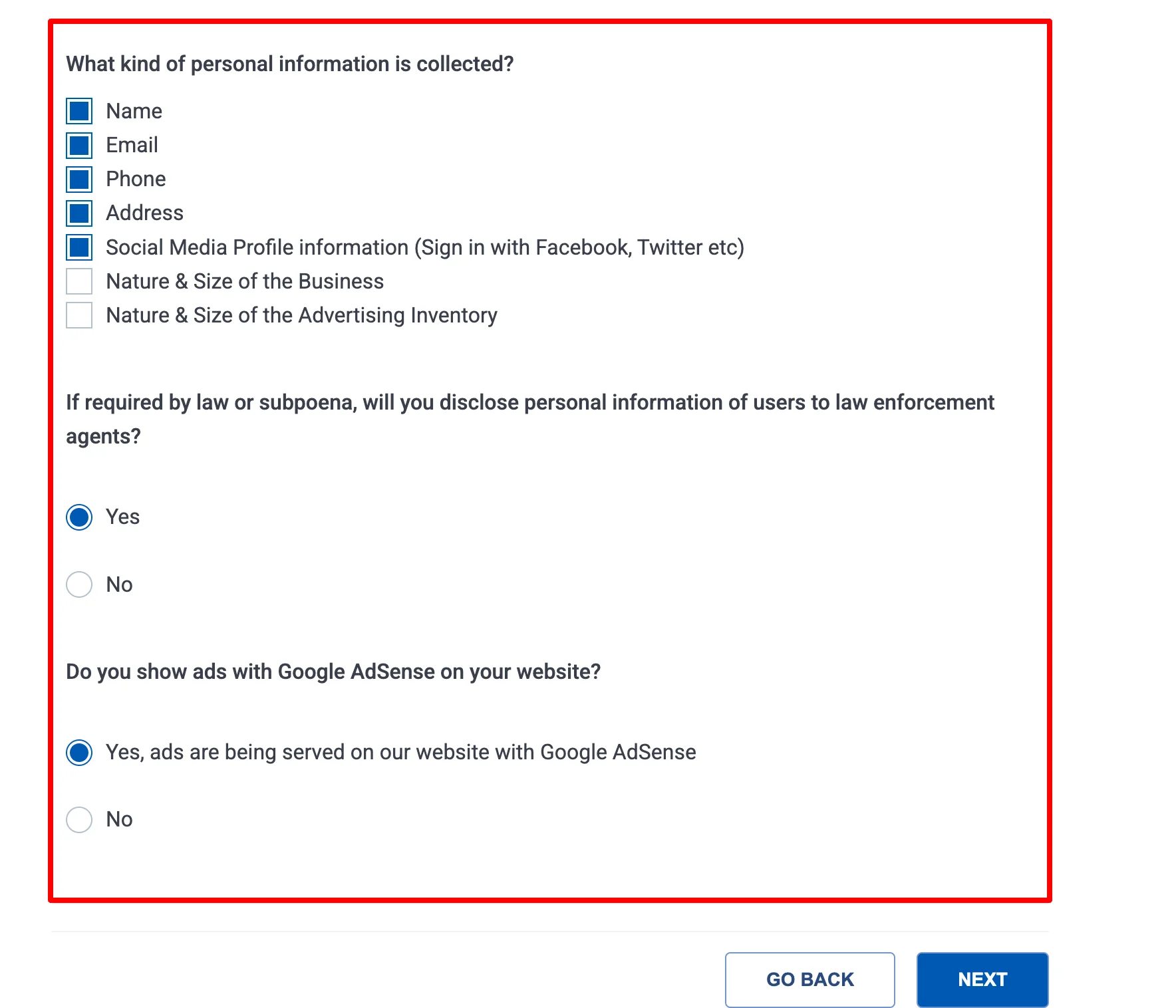
Getting User Consent
It is best to seek consumers’ consent to process their personal data prior to collecting it. Providing consumers with choices for consent before processing their personal data can help comply with the Delaware Personal Data Privacy Act.
One of the simplest ways to get consumers’ consent is to put a checkbox on your website’s data collection pages.
Apart from this, you can also include a cookie banner along with a cookie policy that they have read and accepted, your privacy policy.
You can use consent management platform, such as the WP Cookie Consent plugin, to obtain user consent on your website for the collection of cookies.
WP Cookie Consent Plugin– Consent Management Platform

WP Cookie Consent is the top WordPress plugin that allows sites to manage user consent. It is Google-certified and built to help businesses become compliant with global privacy legislations like GDPR, CCPA, LGPD, Quebec Law 25, and more.
It makes sure that websites collect and handle user consent transparently and legally. Since data privacy laws oblige websites to inform users regarding their data-processing behavior, this plugin is a must for ethical data management.
In addition, you can add a Data Subject Access Request (DSAR) form to your website. WP Cookie Consent also helps you manage DSARs efficiently by collecting, tracking, and responding to user requests.
To learn more, refer to this guide: What is a Data Subject Access Request (DSAR) — A Complete Guide.
Most importantly, WP Cookie Consent meets the opt-out requirements described by DPDPA law.
See what it looks like in the screenshot below.
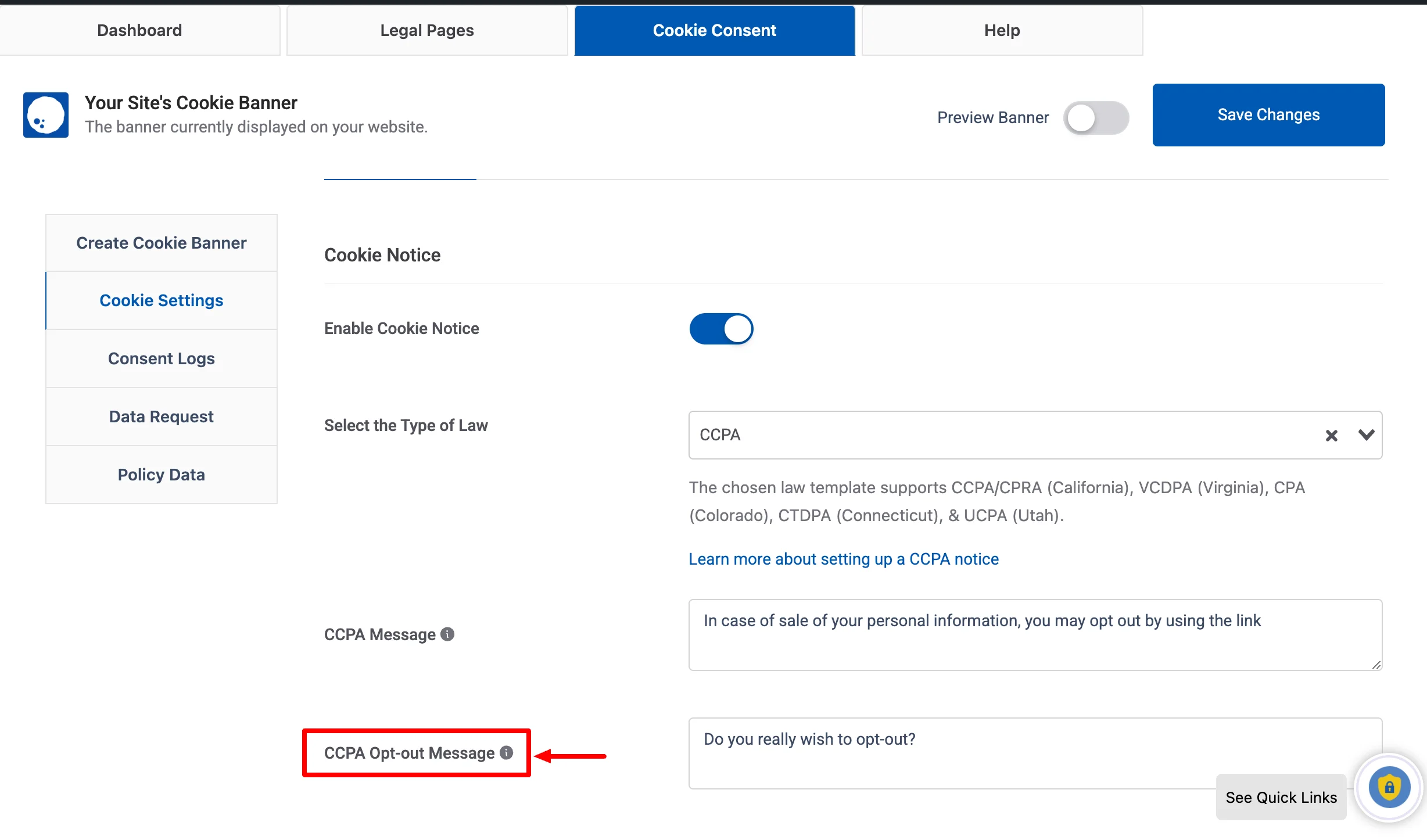
Penalties and Fines for Non-Compliance with the Delaware Privacy Act
The penalties and fines for non-compliance with the Delaware Privacy Act can range from $0 to $10,000 per violation.
The DPDPA stipulates that consumers have no private right of action under this law. In case of inconvenience, the consumers can complain to the Department of Justice.
FAQ
The DPDPA is a state privacy law in the United States that helps protect the personal information of users online.
The Delaware Personal Data Privacy Act applies to any organization that conducts business in Delaware or produces products or services for Delaware residents.
Penalties for non-compliance with the Delaware Privacy Act could be up to $10,000 per violation.
To comply with the Delaware Personal Data Privacy Act, businesses should include a cookie consent banner and an updated privacy policy on their website.
Kathy Jennings is the attorney general for the Delaware Personal Data Privacy Act.
Conclusion
The Delaware Personal Data Privacy Act is currently in effect, and its universal opt-out mechanism obligation will take effect in 2026.
To comply with the new law, companies must revise their cookie and privacy policies to reflect Delaware’s personal data privacy requirements.
In addition, you must give users different options in order to exercise their rights, including a data subject access request (DSAR) form and a cookie consent banner with a preference center.
We recommend using the WP Legal Pages Compliance Platform’s privacy policy generator and consent management platform (CMP) to comply with the Delaware Personal Data Privacy Act.
If you like this article, you might also like:
- An Overview of Iowa Consumer Data Protection Act (ICDPA)
- Texas Data Privacy and Security Act (TDPSA): A Quick Summary
- Pennsylvania Consumer Data Privacy Act (PCDPA)
Are you looking to comply with Delaware Personal Data Privacy requirements? Grab the WP Legal Pages Compliance Platform for easy operations!
